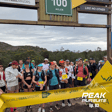
The Future of Trail Running in Australia: Gary Mullins on the AUTRA Playbook
The Australian trail running scene is evolving fast — but its governance, funding, and pathways are still catching up.
In this interview, AUTRA President Gary Mullins unpacks the AUTRA Playbook and explains how AUTRA aims to move from advocacy to authority, working alongside Australian Athletics, professionalising the sport as a whole, standardise events and coaching, empower race directors, and deliver real value to runners at every level.
This episode dives into the real questions: Who holds the power right now? How will governance evolve? And what does it all mean for everyday runners?
From membership models to world championship selection, James and Gary explore what needs to happen next to make trail running stronger, fairer, and more connected.
***Don’t forget, use code PEAK at Bix’s website for 20% off Bix products, exclusive to PPP listeners!***
Thanks for tuning in to Peak Pursuits! Connect with us on Instagram @peakpursuits.pod to share your thoughts, questions, and trail stories. Until next time, keep hitting the trails and chasing those peak pursuits!
Follow AUTRA: Website
Follow James: Instagram | Strava | Website
Music from #Uppbeat (free for Creators!):https://uppbeat.io/t/mood-maze/trendsetter
License code: K08PMQ3RATCE215R




